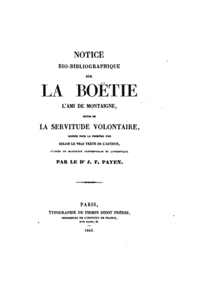
Étienne de la BoÉtie (1530-1563)
 |
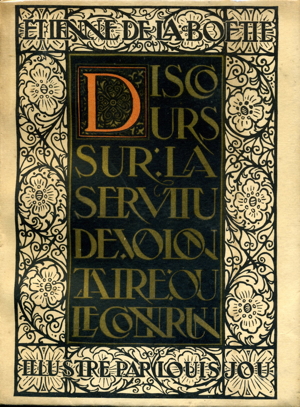 |
| Title page of the 1922 edition illustrated by Louis Jou |
[Created: 23 Nov. 2020]
[Updated: March 27, 2023 ] |
About the Author
See the entry on this author in the Cato Institute's Encyclopedia of Libertarianism (2008) - Sharon Presley, “La Boétie, Étienne de (1530-1563)” <https://www.libertarianism.org/topics/la-boetie-etienne-de-1530-1563>.
Introduction
I should like merely to understand how it happens that so many men, so many villages, so many cities, so many nations, sometimes suffer under a single tyrant who has no other power than the power they give him.
Estienne de la Boétie (1530-1563) was a precocious lawyer, translator, poet, and essayist who was born in Sarlat in south west France. He was appointed to the Bourdeaux Parlement and worked as a judge and diplomat until his death at the age of 32. Boétie was best known as a friend of Montaigne and for his translations of Xenophon and Plutarch. While still a student at the University of Orléans he wrote the essay "The Discourse of Voluntary Servitude" (written c. 1552-53) which was not published in his lifetime because of its radical content.
We know that copies of Boétie's manuscript circulated privately but Montaigne, who inherited Boétie's papers, was reluctant to publish it. Nevertheless, it did appear in print in various forms and was popular among radical groups during the French Revolution and the 19th century when it appeared in several editions. It was rediscovered by modern libertarians in the 1970s and has appeared in several editions since then. Scholars still argue about its authorship, the main issue being the extent to which Montaigne influenced its composition and the problem of its content not being consistent with the career followed by Boétie as a judge officer of the state.
The full title of the essay is Discours de la servitude volontaire ou le Contr'un (Discourse on Voluntary Servitude, or the Nay-Sayer). The subtitle "contr'un" is hard to translate but it provides a key to the meaning of the pamphlet: someone who stands up and refuses to submit to the will of the tyrant. Thus, "nay-sayer" or, to borrow a Russian word, a "refusenik." Boétie asks one of the most profound questions of political theory, why does the majority obey the commands of the small minority of people who run the state? His answer is that custom, education, state propaganda, and the promise of some material benefits encourage people to obey and to accept the legitimacy of their ruler. Boétie's solution to the problem of a tyrannous government is for the majority to "just say no", or in other words to withdraw their consent and become a political "nay-sayer".
In the course of his discussion Boétie also describes the pyramid-like structure of the small group of people who benefit most from their privileged access to the state. It is an early form of a classical liberal class analysis of the state. First there is the ruler, then the 6 or so close advisors who have his ear, then the 600 they employ to carry out their commands, then the 6,000 who get jobs at taxpayer expense, and so on. The actual numbers are invented but the idea is a cogent one.
See also the entry on La Boétie by Sharon Presley, “La Boétie, Étienne de (1530-1563)” Encyclopedia of Libertarianism (2008).
Parallel Versions of the Texts
We have two pages where 2 or more of the different edtions of Boétie's Discourse on Voluntary Servitude can be viewed side-by-side.
- the first one highlights the lovely illustrated version of the text which appeared in 1922 done by the Spanish typographer and engraver Louis Jou (1881-1968). Next to it is another French edition from 1922 edited by Paul Bonnefon.
- the second allows a comparison of several different versions of the text, both in French (1577, Mesmes manuscript, Bonnefon (1922)) and English translations ("T. Smith" (1735), Kurz (1942)).
The Art of the Discourse
I have put together a collection of interesting cover art for editions of La Boétie's Discours de la Servitude volontaire. It includes French, English, and German editons. I have organised them into themes: chains and cages, classic portraits and art, oppressed figures and their oppressors, minimalist design and abstract art, cartoons and drawings, and advertising for events or performances.
 |
 |
 |
Texts in the Collection
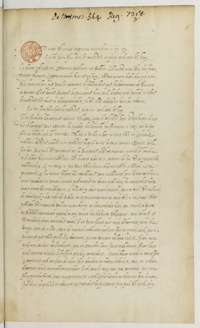 |
This is the earliest manuscript copy of Boétie's book Discours de la Servitude volontaire which he probably left to his friend Montaigne in his will. It came into the possession of Henri de Mesmes who wrote some comments and observations in the margins. It was put online by the Département des manuscrits of the Bibliothèque nationale de France. Note: It is available here in facs. PDF or it can be viewed side-by-side a modern French version (by Bonnefon), along with other editions of the text. |
|
Étienne de la Boétie, Discours de la servitude volontaire (1553). The manuscript was privately circulated because of its radical content and was published in various pirated editions by French Protestants who opposed persecution by the French Catholic state. His friend Montaigne published a version which is the version which most people know. However, a copy of the original manuscript was in the possession of one of his contemporary critics Henri de Mesmes which was published in 1853 in a form which kept most of the original spelling. The original "Mesme manuscript" - facs. PDF. It was the bsis for this edition: Notice Bio-Bibliographique sur La Boëtie L'ami de Montaigne, Suivie de La Servitude Volontaire, donnée pour la première fois selon le vrai texte le l'auteur, d'après un manuscrit contemporain et authentique. par le Dr J. F. Payen. (Paris, Typographie de Firmin Didot Frères, Imprimeurs de L'institut de France, 1853). This book is available in various formats:
|
 |
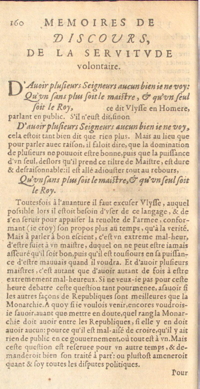 |
[Anon.], "Discours, de la servitude volontaire," in [Simon Goulart], Memoires de l'estat de France, Sous Charles neufiesme. Troisiesme volume (Meidelbourg [Genève?], 1576—77), pp. 160-91. [PDF] of Boétie's Discours (unnamed); [PDF] of entire volume. Note: This was the version which circulated fairly widely until it was eventually included as an appendix to Montaigne's Essais. |
 |
[Boétie], Vive description de la tyrannie, & des tyrans, avec les moyens de se garentir de leur joug (Reims: Jean Mouchar, 1577). [facs. PDF] Note: This is one of several pirated editions of Boetie's book which were circulated by Protestants who opposed religious persecution in France. It does not include his name on the title page and the place of publication is probably fictitious in order to escape the wrath of the censors. |
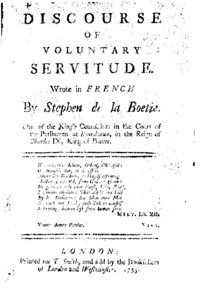 |
Stephen de la Boetie, Discourse of Voluntary Servitude. Wrote in French By Stephen de la Boetie. One of the King's Councelors in the Court of the Parliament at Bordeaux, in the Reign of Charles IX of France. London: Printed for T. Smith, and sold by the Booksellers of London and Westminster, 1735. This book is available in various formats:
Note: This edition was transcribed and published as The Will To Bondage. Edited by William Flygare and with a preface by James J. Martin (Colorado Springs , Colo.: R. Myles, 1974). This edition has the French on one side and the English on the other. I have not been able to track down an electronic version of this text. |
 |
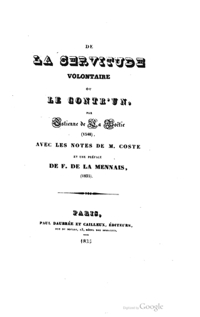 |
De la Servitude volontaire ou le Contr'un, par Estienne de La Boétie (1548), avec les notes de M. Coste et une Préface de F. de La Mennais (1833) (Paris: Paul Daubré et Cailleux, 1835). [facs. PDF]
|
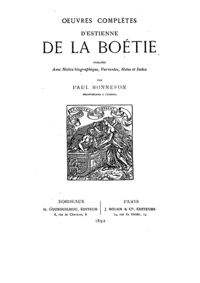 |
Etienne de la Boétie, Oeuvres complètes d'Éstienne de la Boétie, publiées Avec Notice biographique, Variantes, Notes et Index par Paul Bonnefon (Paris: J. Rouam, 1892). "Discours," pp. 1-57 (with "variantes" indicated). [facs. PDF] |
 |
Étienne de La Boétie, Von der freiwilligen Knechtschaft des Menschen. Translated by Gustave Landauer in Der Sozialist (1910-11). [HTML version] and [facs. PDF] |
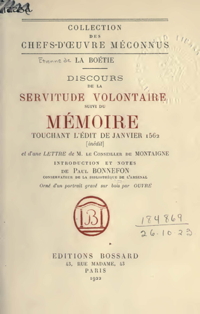 |
Étienne de La Boétie, Discours de la servitude volontaire : suivie du Mémoire touchant l’édit de janvier 1562 [inédit] et d’une lettre de M. le conseiller de Montaigne. Introduction et notes de Paul Bonnefon. Conservateur de la Bibliothèque de L’Arsenal. Orné d’un portrait gravé sur bois par Ouvré (Paris : Bossard, 1922). This book is available in various formats:
|
 |
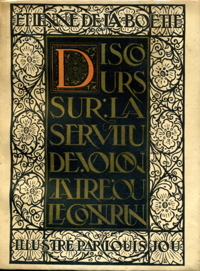 |
Étienne de La Boétie, Discours de la servitude volontaire, ou le Contr'un. Illustré par Louis Jou (Paris: Jou et Bosvie 1922). [facs. PDF]
|
 |
ANARCHY 63 (Vol 6 No 5) MAY 1966. Introduction and revised and edited translation by Nicolas Walter. "Introduction," pp. 129-37; a revised version of the 1735 translation by "T. Smith", pp. 137-52. |
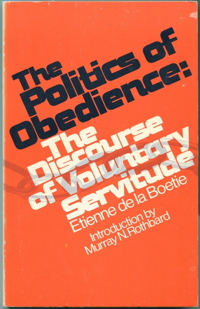 |
The Politics of Obedience: The Discourse of Voluntary Servitude by Étienne de La Boétie. Introduction by Murray N. Rothbard. Translated by Harry Kurz (New York: Free Life Editions, 1975). Reprinted by Ludwig von Mises Institute, Auburn, Alabama, 2008. [PDF]
|
